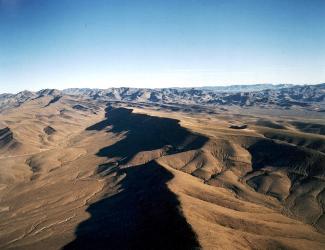An additional $10 million in funding has been approved for the Nuclear Regulatory Commission (NRC) to complete its review of the licence application for the Yucca Mountain repository. Last year, the NRC shelved the review after funding was slashed.
 |
| Yucca Mountain (Image: DoE) |
The House of Representatives has voted 326-81 to adopt an amendment to the fiscal 2013 Energy and Water Development Appropriations Act (HR 5325) that transfers $10 million from the Department of Energy's (DoE's) administration account to the NRC's salaries and expenses account. The amendment - introduced by Congressman John Shimkus, chairman of the Environment and the Economy Subcommittee - increases the NRC's funds for the review from $25 million to $35 million.
Federal responsibility for all US civil used nuclear fuel was enshrined in the 1982 Nuclear Waste Policy Act, which was amended in 1987 to designate Yucca Mountain as the sole initial repository for the country's high-level nuclear waste, effectively tying the entire US high-level waste management program to the fate of the Nevada site. However, with billions of dollars since being spent on evaluating Yucca Mountain, the Obama administration eliminated the project's funding in early 2010 and the DoE subsequently withdraw its licence application.
"After having spent 30 years and $15 billion, the NRC refuses to follow the law and complete the review process. This amendment removes the excuse that they do not have the funds to perform their task."
Congressman John Shimkus
The Atomic Safety and Licensing Board (ASLB) ruled in mid-2010 that the Yucca Mountain project and the site were authorised by Congress in 2002 and the DoE did not have the right to cancel and withdraw the licence application without going back to the lower house. The licence application was therefore returned to the NRC for review.
In 2011, the NRC failed to overturn the ASLB's ruling. This decision affirmed the legal responsibility of the NRC to review the licence application, but the commission still instructed the ASLB to close out the licence review process citing inadequate funding.
Following the adoption of the amendment, Shimkus said, "This continues to show House support for completion of the Yucca Mountain review process within NRC. After having spent 30 years and $15 billion, the NRC refuses to follow the law and complete the review process. This amendment removes the excuse that they do not have the funds to perform their task."
Fred Upton, chairman of the Energy and Commerce Committee, commented, "I applaud Shimkus for offering this amendment to ensure the future of Yucca Mountain is no longer held captive to political games by allowing the NRC, as the independent objective federal agency, to finish the review."
The Washington DC-based Nuclear Energy Institute (NEI) welcomed the approval of the amendment. Alex Flint, NEI's senior vice president for governmental affairs, said: "Congressman Shimkus' leadership in this area has been central to Congress' effort to spur the development of a disposal facility that will safely and securely manage nuclear fuel from commercial and defence applications."
However, he added, "The nuclear industry remains concerned about the termination of Yucca Mountain, the only program fulfilling the Department of Energy's legal obligation under the Nuclear Waste Policy Act to dispose of used nuclear fuel from commercial reactors and defence applications. The Yucca Mountain project should proceed and be funded so the technical review of the licence application is completed."
There are currently over 65,000 tonnes of used nuclear fuel stored at about 75 operating and shut down reactors sites across the USA, with an additional 2000 tonnes being produced annually. The DoE is also storing a further 2500 tonnes of used fuel and large volumes of high-level waste - mostly from past weapons programs - at a few government-owned sites.
Researched and written
by World Nuclear New




_28178.jpg)
_66891.jpg)
_30199.jpg)
_72306.jpg)





